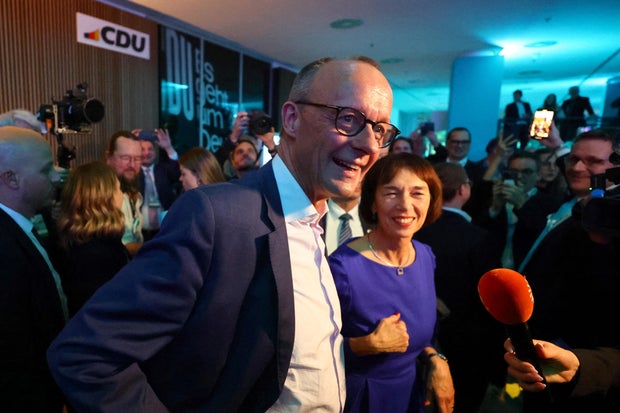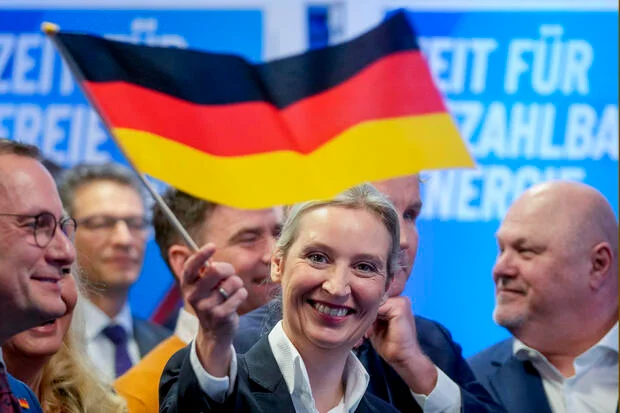Germany’s national election has produced a major political shift, with mainstream conservatives led by Friedrich Merz securing victory while the far-right Alternative for Germany (AfD) surged to become the country’s second-largest party. Official provisional results released by the electoral authority confirmed these developments, highlighting the electorate’s dissatisfaction with the ruling coalition and signaling a potential change in the country’s political direction.
The election, held seven months earlier than originally planned, followed the collapse of Chancellor Olaf Scholz’s unpopular coalition government in November. Widespread public discontent and concerns over economic stagnation, migration policies, and Europe’s geopolitical challenges played a key role in shaping voter preferences.
Friedrich Merz’s Christian Democrats (CDU/CSU) emerged as the largest party, securing 208 seats in the 630-seat Bundestag. Meanwhile, the far-right Alternative for Germany (AfD) achieved its strongest showing to date, winning 152 seats and overtaking Chancellor Scholz’s Social Democrats (SPD), who suffered a crushing defeat with just 120 seats.
The Left party secured 64 seats, while smaller parties, including the left-wing Sahra Wagenknecht Alliance and the pro-business Free Democrats (FDP), failed to cross the 5% threshold required to gain parliamentary representation.
The results place Merz in a commanding position to become Germany’s next chancellor. Speaking on election night, Merz expressed his intention to form a government by Easter at the latest. However, he ruled out any coalition with the AfD, maintaining the established “firewall” against the far-right party.

The AfD’s rise to the position of Germany’s second-largest party marks a significant shift in the country’s political dynamics. Since its founding in 2013, the party has grown from a Eurosceptic platform into a broader movement focusing on anti-immigration and nationalist policies.
On election night, AfD leaders celebrated their record-breaking performance, pledging to continue their growth and aim to become Germany’s leading political force in future elections. Despite this success, the AfD remains politically isolated, as all other major parties have refused to collaborate with them due to concerns about their extremist ties.
German domestic intelligence agencies have classified some regional branches of the AfD as “proven right-wing extremist” groups. This designation is especially sensitive in light of Germany’s Nazi past. The party denies these accusations and argues that its policies reflect the concerns of ordinary Germans who feel abandoned by the political establishment.
Several pressing issues dominated the election campaign:
- Economic Stagnation: Voters expressed deep frustration over the sluggish performance of Europe’s largest economy. Rising living costs, energy insecurity, and slowing industrial growth have fueled concerns about Germany’s future economic competitiveness.
- Migration Policy: Immigration was a central focus of the election. Merz adopted a hardline stance, advocating for stricter border controls and a tougher approach to illegal migration. This position resonated with many voters and contributed to the success of both his party and the AfD.
- Geopolitical Uncertainty: Concerns about the ongoing war in Ukraine and Germany’s role in European security also shaped the political debate. As Ukraine’s second-largest weapons supplier after the United States, Germany faces increasing pressure to maintain its support while balancing domestic priorities.
The election results drew swift responses from global leaders, highlighting the importance of Germany’s role on the international stage.
Former U.S. President Donald Trump welcomed the outcome, suggesting that German voters, like their American counterparts, were rejecting progressive policies. On his Truth Social platform, Trump wrote:
“Much like the USA, the people of Germany got tired of the no common sense agenda, especially on energy and immigration, that has prevailed for so many years. This is a great day for Germany.”
Ukrainian President Volodymyr Zelenskyy congratulated Merz in a post on X (formerly Twitter), emphasizing hopes for continued cooperation. He wrote:
“We look forward to continuing our joint work with Germany to protect lives, bring real peace closer to Ukraine, and strengthen Europe.”
NATO Secretary General Mark Rutte also extended his congratulations, underscoring the importance of Germany’s leadership in defense policy. He stated:
“I’m looking forward to working with you in this crucial moment for our shared security. It’s vital that Europe step up on defense spending and your leadership will be key.”
While Merz prepares to navigate complex coalition negotiations, Chancellor Olaf Scholz will remain in office until a new government is formed. Scholz’s three-year tenure was marred by internal disputes within his coalition, which ultimately led to its collapse.
Forming a new government could prove challenging. Although Merz’s Christian Democrats hold the most seats, they lack an outright majority. Potential coalition partners are limited after the failure of smaller parties to reach the electoral threshold.
Despite these challenges, Merz struck a determined tone in his victory speech:
“I am aware of the responsibility. I am also aware of the scale of the task that now lies ahead of us. I approach it with the utmost respect, and I know that it will not be easy,” he said.
He also emphasized the urgency of forming a new government:
“The world out there isn’t waiting for us, and it isn’t waiting for long-drawn-out coalition talks and negotiations.”
Germany’s political shift carries profound implications for the European Union, NATO, and global geopolitics. As the EU’s largest economy and a leading voice in transatlantic relations, Germany’s stance on key issues ranging from migration to military spending will influence the continent’s direction in the coming years.
The rise of the AfD also reflects broader trends across Europe, where far-right and nationalist parties are gaining momentum. This outcome may inspire similar movements in other EU member states, challenging the established political order.
As Friedrich Merz moves closer to the chancellorship, all eyes will be on Germany’s ability to navigate these complex challenges and chart a course for the future.



